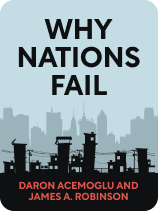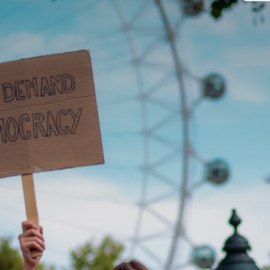

This article is an excerpt from the Shortform book guide to "Why Nations Fail" by Daron Acemoglu and James A. Robinson. Shortform has the world's best summaries and analyses of books you should be reading.
Like this article? Sign up for a free trial here.
What are inclusive political institutions? Why do they create prosperous nations?
In the book Why Nations Fail, economist Daron Acemoglu and political scientist James A. Robinson explain that inclusive nations—those with free and fair economies and governments—succeed. According to them, inclusive political and economic institutions are the backbone of a thriving nation.
Read on to learn why inclusive political institutions create a powerful and wealthy nation, according to Why Nations Fail.
Inclusive Political Institutions
While nations can change, the authors of Why Nations Fail acknowledge that these changes are historically exceptional—for the most part, exclusive nations tend to remain exclusive and inclusive nations tend to remain inclusive. This is in part due to the close links between economic and political institutions. Wealthy groups can gain political power and powerful groups can influence economic policy—therefore, exclusive institutions that concentrate political power also concentrate wealth, while inclusive political institutions that disperse political power also disperse wealth. This close link also can create a feedback loop: Those who benefit from economic institutions gain more political power and wealth which they then use to influence those institutions in order to benefit more, and so on.
(Shortform note: Thomas Piketty (Capital in the Twenty-First Century) agrees that there’s a “feedback loop” concentrating wealth in the hands of a few over time. However, he suggests that this feedback loop benefits everyone who’s wealthy—not just politicians but also CEOs, stockbrokers, and lucky heirs to massive fortunes. Piketty argues that even if the ultra-wealthy stop working entirely, they can still reinvest their fortunes to make even more money, labor-free. Furthermore, he argues that without widespread action, this concentration of wealth will only continue further: As the wealthy gain more money, they’ll have more to reinvest, and can make even more while doing even less.)
Characteristics of Inclusive Political Institutions
Authors Daron Acemoglu and James A. Robinson provide two main standards a political institution must meet for it to be considered inclusive:
1) Pluralism: A pluralistic institution creates limits on its own power and gives political power to the population at large. Pluralism is necessary for inclusive political institutions because it not only gives power to the populace but also ensures that the government can’t take that power away. For example, a free and fair election is pluralistic because it allows everyone in society to exercise political power by voting. There are also limits on what a pluralistic election can accomplish—a constitution might guarantee certain rights that even an election result or elected official can’t get rid of, like a right to free speech.
2) Consistent enforcement: A nation also needs the power to consistently enforce the rules and limits of political institutions. Consistent enforcement is necessary for inclusive institutions because it ensures that those in power will actually respect and follow the rules of political institutions. For example, if a country with inclusive institutions has a president who refuses to give up power, some kind of enforcement (like the military, federal police, or the judiciary) will step in and remove that president—upholding the rules of the nation’s inclusive political institutions.
Why Inclusive Institutions Lead to Success
Acemoglu and Robinson offer two main reasons why inclusive political institutions lead to success:
1) Encouraging productivity: Inclusive institutions encourage citizens to be more productive and create more wealth. This is because they give citizens personal incentives to do so—under inclusive institutions, citizens know that the wealth they create is secure and that they can use it on whatever they want. In addition, citizens can choose the job that best suits their skills, allowing them to do better and more productive work.
2) Encouraging new ideas: Inclusive institutions also encourage new ideas and technological developments. Opportunities for entrepreneurship allow citizens to develop new technologies and give them a personal incentive for doing so (money). Then, other citizens (who, like the entrepreneurs, can spend their money as they choose) will gravitate toward the best ideas. This gives both entrepreneurs and consumers personal incentives for technological development. Technological development is crucial for success, argue Acemoglu and Robinson. Historical examples like England’s early adoption of the steam engine or Japan’s tech boom in the 1970s show that being on the technological cutting edge creates lots of wealth.
How a Nation Remains Inclusive
The authors argue that nations tend to remain inclusive because their people have a vested interest in keeping them that way. A population will resist any attempt to take away their economic and political freedoms—and existing inclusive institutions give them wealth and political power they can use to protect these freedoms. Efforts to protect freedoms take many forms. In particular, Acemoglu and Robinson note the importance of political demonstrations, an independent and free press, and widespread education. All of these help to create an informed and motivated population that recognizes the benefits of inclusive institutions and is willing to protect them.
(Shortform note: In the decade since Acemoglu and Robinson published Why Nations Fail, many political commentators have noted a growing trend of democratic nations willingly electing autocratic leaders. These leaders use populist ideology, polarization, and misinformation to convince a population to partially or entirely abandon democracy. This trend challenges Acemoglu and Robinson’s claim that citizens will actively fight to protect inclusive political institutions. The authors have spoken on this subject in the context of the United States and suggest that this trend results from exclusive economic institutions. These institutions left many poor and frustrated with their existing government—and more open to autocrats as a result.)

———End of Preview———
Like what you just read? Read the rest of the world's best book summary and analysis of Daron Acemoglu and James A. Robinson's "Why Nations Fail" at Shortform.
Here's what you'll find in our full Why Nations Fail summary:
- Why some nations have wealth while others struggle with poverty
- Why open nations thrive and exclusive nations typically fail
- How and why some nations change over time






